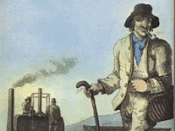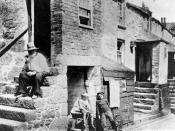Themes of The Ghost Road, by Pat Barker
Exploitation
Britain (Western Europe in general) was a society of exploitation. Barker appears to be saying that any society that allows the inequalities of early 20th Century Britain, while thinking itself completely fair and civilised, is sick at heart - bad things will happen to people, whether on the scale of the war horrors or just the individual evilness of abusing a child. The lies at the core of this exploitation are the lies that feed the war machine - they keep it alive.
The Ghost Road details the exploitation and marginalisation of young men (soldiers), the working class, children and women. The most obvious example of exploitation is the waste of the lives of the young men. They are sacrificed in their millions on both sides for the old ruling elite. Regardless of the reasons - the last gasps of imperialism or the beginnings of modern nationalism - it can be viewed simply as the old exploiting the young.
So many young men died in France that to survive 6 months of the war made you old. Prior notes that in "trench-time" he was Hallet's great-grandfather. Hallet is an obvious example of the exploitation of youth. Barker purposely makes him a likeable, good-looking young man (Prior thinks him "quite fetching") and then signals the sacrificed youth symbolism with the riderless rocking horse in Amiens. When Hallet finally dies, surrounded by his grief stricken family, his own idealism shattered, the sense of exploitation is very strongly evident - his young life was used to prolong a meaningless conflict.
The exploitation of the working class is also a major part of this theme. Prior, being from the working class himself, finds class inequalities distasteful. The ruling elite sees the working class as...


